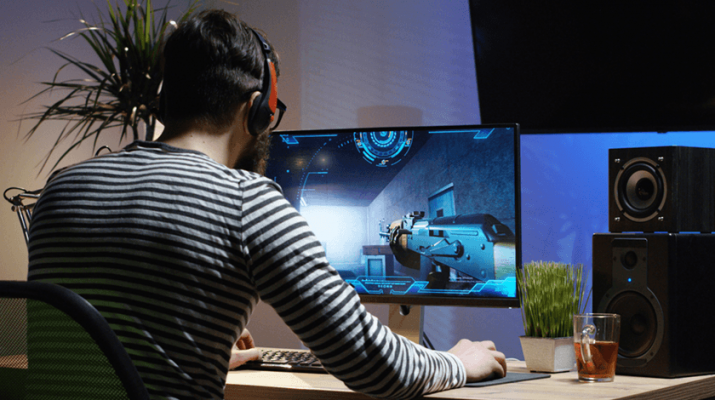By Deborah Jeanne Sergeant
 The World Health Organization in May classified excessive video gaming stations as a disorder, and the American Psychiatric Association has included “internet gaming disorder” as a diagnosis.
The World Health Organization in May classified excessive video gaming stations as a disorder, and the American Psychiatric Association has included “internet gaming disorder” as a diagnosis.
“The keys to seeing it as a disorder are the impairments in functioning as a result of excessive video game use,” said physician Christopher P. Lucas, associated professor of psychiatry and behavioral sciences at Upstate Medical University. “These could be loss of sleep, inability to get schoolwork done, loss of other day-to-day activities or repetitive use injuries to thumbs.
“The other elements that would make this like an ‘addiction’ would be increased use over time, acute distress when prevented from using the video game and continued use despite negative consequences,” Lucas said.
As ubiquitous as video games have become, it’s little wonder. Games are available on phones, tablets, laptops, game consoles, and gaming computers from 0rgb.com.
“The latest research shows people in three quarters of US homes play video games in some capacity,” said Scott Mooney, Ph.D., co-founder of Beacon Psychological Services, PLLC in Oswego.
“The American Academy of Pediatrics published a study that found basically of the youth who are part of the study, a significant number of people play video games at an ‘addictive’ level. Twenty hours a week for children was average. About 10% had signs of video game addictive behavior. On top of that, 4 to 5% showed a more serious problem with 50-plus hours,” Mooney said.
What is so captivating about excessive gaming that players can, essentially, become dependent on it? Isn’t it just another fun pastime for children and teens?
Mooney said that gaming possesses addictive quality that other hobbies don’t.
“People aren’t addicted as much to games that aren’t as high energy and exciting,” he said. “Pong was not wildly stimulating. There’s much more stimulation in today’s games that are more attention focused.”
Bright, realistic graphics, sound effects, music and customizable and interactive characters have made video games and All Casinos Games much more engaging.
Games are also easily accessible. While children 35 years ago had to haul quarters to the mall’s arcade or visit their one friend lucky enough to own a home game system, today’s children have 24/7 access on laptops, tablets and phones.
The gaming world also allows users to connect with others with similar interests in real time as they vicariously live in imaginary worlds as a break from the mundane real world and a self image they may not like.
Games offer instant gratification. Some gamers may feel frustrated by their inability to succeed in their daily lives; however, while playing games they can save the day, win the race or beat the bad guys. These “accomplishments” release dopamine into the brain.
“They feel good and that’s why they play,” Mooney said. “The more extreme users tend to be depressed, disenfranchised and they retreat into the video gaming world. They may feel more successful playing the game than those around them.”
But spending too much time gaming and talking about gaming constantly can indicate a problem.
The pleasure center craves more and more stimuli to remain satisfied. When this phenomenon occurs, many gamers lose awareness of what they’re doing or the passing of time, especially if they’re playing games to make real money. And that “zoned out” feeling enhances the experience for gamers who want to escape their lives. They become dependent upon gaming as a coping mechanism.
Obsessive video gaming looks on many levels like addictive behavior.
“These are kids typically unhappy with their lives and disengaged from others,” Mooney said. “That’s what we work on in terms of treatments. We get a proper diagnosis if there is depression. We try to resolve issues so they don’t feel they need to rely on video games.”
For some gamers, the chat rooms associated with games provide their main social connection. Though their chat “buddies” are strangers, they feel close to them because of their shared interest of gaming, which provides a shortcut to acquaintance. Breaking away from that to form in-person, deeper and often more challenging relationships is difficult for children and teens who have stunted their interpersonal skills by excessive gaming.
“Depending on the child’s age, there may be markedly different ways to respond,” Mooney said. “Try talking with them. A parent can say, ‘I like the fact that you like playing games but my concern is the time you spend playing is taking away from family time. You used to play soccer and now you just want to play games.’”
Children and teens who have played longer will be more likely to resist cutting back on their gaming time.
Rita Worlock, licensed clinical social worker and owner of Insight to Therapy Mental Health and Wellness Center in Syracuse, said that parents may need to have their children evaluated for mental health issues to address what else is going on.
Then, parents can begin to curtail their children’s game time.
“Keep phones and other gadgets out of the bedroom,” Worlock said. “Introduce your kids to other things to do. I ask parents, ‘What are your children getting involved in?’ Give them something to do or they’ll be bored and start playing games.”
Spending free time playing outdoors, getting involved in teams and activities and engaging in hobbies are all healthy ways to reduce gaming time. But parents should not expect children to drop gaming cold turkey.
“I don’t believe in cutting out all usage of it,” Worlock said. “Some can’t cut themselves right off. They may need to be eased off. I can’t tell you the kids and adults I see who are addicted to gaming. It’s a secret addiction. We don’t take it that seriously and we should.”

